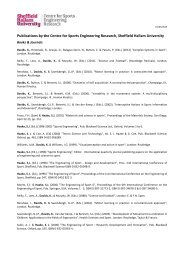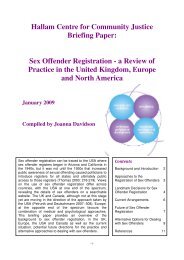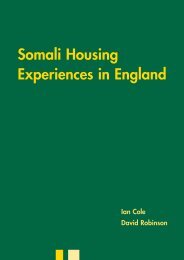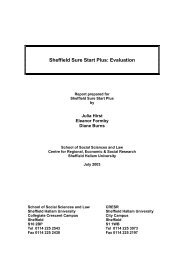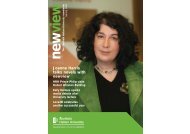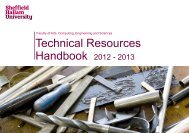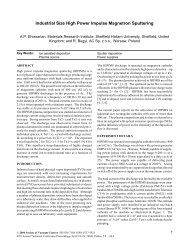The exercise of judicial discretion in rent arrears cases - Sheffield ...
The exercise of judicial discretion in rent arrears cases - Sheffield ...
The exercise of judicial discretion in rent arrears cases - Sheffield ...
Create successful ePaper yourself
Turn your PDF publications into a flip-book with our unique Google optimized e-Paper software.
observation data generally supports the conclusion that this relationship affects the outcome<br />
<strong>of</strong> <strong>cases</strong>.<br />
Trust and Outcomes<br />
If one posits that high levels <strong>of</strong> trust exist between claimants and district judges, which affect<br />
the outcomes <strong>of</strong> <strong>cases</strong>, then one might anticipate that there would be a relationship between<br />
the requests made by claimants and the actual decision. We drew on our quantitative data<br />
to exam<strong>in</strong>e whether this relationship had an impact on the outcome <strong>of</strong> the decision by<br />
consider<strong>in</strong>g how <strong>of</strong>ten district judges granted the order requested (we were able to record<br />
this data <strong>in</strong> 502 <strong>cases</strong>).<br />
Chart 7 below demonstrates that there is an appa<strong>rent</strong> relationship between the request and<br />
the outcome on first hear<strong>in</strong>g <strong>of</strong> the case (which might have been anticipated) but that this is<br />
by no means uniform. What can be said from our sample is that where landlords <strong>in</strong> our<br />
sample requested an adjournment, this was almost always granted (<strong>in</strong> 98% <strong>of</strong> requests).<br />
This is not particularly surpris<strong>in</strong>g as it would be unusual for a judge to grant an order for<br />
possession where the claimant has only requested an adjournment. <strong>The</strong> ‘other’ category<br />
reflects those <strong>cases</strong> where, for example, the claimant requests that the case be withdrawn or<br />
does not attend the court.<br />
Requests for a suspended possession order or outright possession were more likely to be<br />
granted than not (67% and 76% respectively), but there is greater distribution <strong>of</strong> outcomes<br />
than with requests for adjournment. Some caution should be <strong>exercise</strong>d when consider<strong>in</strong>g<br />
this data, however, as other factors may be at play for which we could not control. For<br />
example, it may be the case that landlords only request outright possession orders <strong>in</strong> the<br />
most hopeless <strong>of</strong> <strong>cases</strong> (from the tenant’s po<strong>in</strong>t <strong>of</strong> view) such as abandonment; or request<br />
suspended orders where the <strong>arrears</strong> are high and not related to hous<strong>in</strong>g benefit.<br />
Nevertheless, the data does suggest that the request does have some bear<strong>in</strong>g on the<br />
outcome.<br />
43



